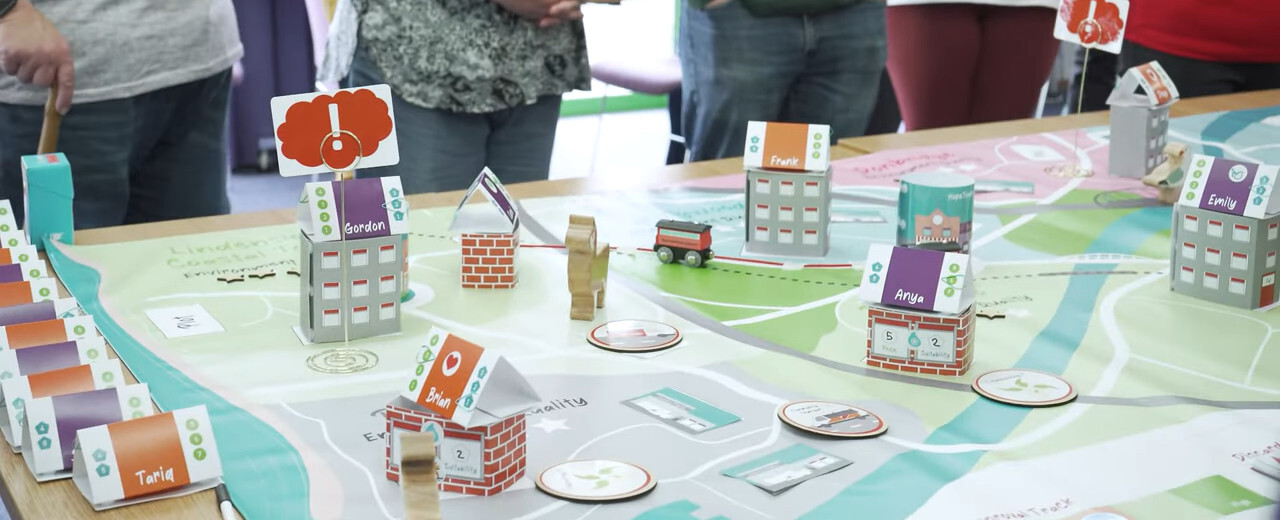On Agents and Avatars and Immersion and more
A couple of recent comments about games, and being immersed in them, really got me thinking.
Firstly - in this comment on LinkedIn, Vikki McCall of the Socialudo social enterprise was commenting on my post about using fictional scenarios for serious games. She said “when the fictional scenarios are driven by research and real lived experience that can add some real impact”.
This is absolutely true. I think a benefit of an imagined scenario is that it removes a lot of the baggage people might bring to a game, so players can concentrate on the issues and decisions abstractly, without being caught up in either an historical context, or their own personal experience.

Socialudo's game HopeTown.
Also it’s why I’m more interested in designing games than playing them. A lot of recreational games have an interesting or challenging mechanic at their core, and then a light dusting of a theme over it to inspire the names of resources and the art for the board, and so on. Whereas I’m particularly interesting in the mechanics of the real world, even if you abstract them to a few simple choices, I think it’s being able to play in simplified versions of those real world choices that makes games so interesting, recreationally or professionally.
But also another thought sprung up - which is why this is a blog post rather than just a comment. I realise how much the point Professor McCall made means to me … “driven by research and real lived experience”. If a game stops me doing something I want to know why, and I think I’m less tolerant of “it unbalances the mechanics” more than most.
Similarly I drop out of any media I’m watching when that internal consistency fails. Even if it’s something magical, say literal magic, or superhero powers and similar, I’m onboard with those ideas if they make sense within the context of the media. But as soon as the world serves the plot, I’m no longer as involved in whatever I’m watching or reading as I could be.
Which brings me on to immersion, and my second reference.

The Ludology Podcast.
In an effort to be someone who listens to podcasts, rather than someone who only subscribes to them, I listened to Thinking Beyond Mechanisms Episode 2 recently. In this short episode the host, Sarah Shipp, describes the thinking of Gordon Calleja, who is unpacking the concept of immersion in games.
To loosely summarise this, realising that I’m twice removed from the original work by Calleja:
- There are two types of immersion: absorption, and transportation.
- Absorption relates to the narrow focus of attention, does the game absorb all of your available attention. Also called “engagement” or “resonance”.
- Transportation is when you are mentally transported into the game, so you are not playing the game, you are in the game. This is achieved when a game’s mechanics are closely aligned with its theme.
Sarah goes on to explain that abstract mechanisms can harm immersive transportation, even if thematic mechanisms are present. Sarah handles this issue in her own designs by separating necessary abstract mechanisms from thematic mechanisms.
To explain this method, she detours into Gil Hova’s1 model for thematic integration. Looking this up online sent me down a rabbit hole I don’t have time to explore right now, so I’m sticking with my summary of Sarah’s summary for now. Hova’s model has three roles, the player, the avatar, and the agent:
- The player is, well, the player.
- The avatar is the narrative representation of the player in the game. The player interacting with the avatar is what creates transportation.
- The agent is the mechanical representation of the player in the game. The agent is the player/avatar interacting with the mechanics.
- The avatar and the agent overlapping means that the mechanics are thematic.
Abstract mechanics are necessary for a game to work, and are purely agential2. If agential moments are kept separate then immersion isn’t affected, these “agential pauses” can be tolerated by people in small doses. For example, having to shuffle a pack of cards.
The difference between transportation and absorption is useful to keep in mind when designing a game because it helps you determine how you want to affect a player. Do you want them to be absorbed by the game or do you want them to be in the game. Or ideally, both?
-
Hova has also hosted the Ludology podcast. I found it pretty difficult to find his full name and the correct spelling, so this footnote is mainly to help you search for his work, which I also aim to be doing at some point soon. ↩︎
-
Meaning that they relate to the agent. It’s almost definitely a real word. ↩︎
